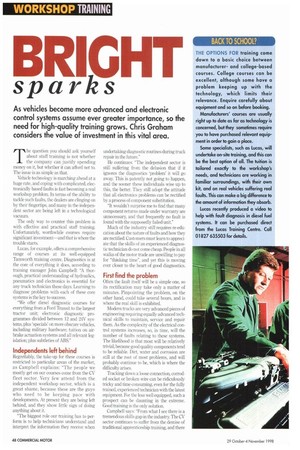BRIGHT
Page 50

Page 51

If you've noticed an error in this article please click here to report it so we can fix it.
sparks
As vehicles become more advanced and electronic control systems assume ever greater importance, so the need for high-quality training grows. Chris Graham considers the value of investment in this vital area.
BACK TO SCHOOL?
THE OPTIONS FOR training come down to a basic choice between manufacturerand college-based courses. College courses can be excellent, although some have a problem keeping up with the technology, which limits their relevance. Enquire carefully about equipment and so on before booking.
Manufacturers' courses are usually right up to date as far as technology is concerned, but they sometimes require you to have purchased relevant equipment in order to gain a place.
Some specialists, such as Lucas, will undertake on-site training, and this can be the best option of all. The tuition is tailored exactly to the workshop's needs, and technicians are working in familiar surroundings, with their own kit, and on real vehicles suffering real faults. This can make a big difference to the amount of information they absorb.
Lucas recently produced a video to help with fault diagnosis in diesel fuel systems. It can be purchased direct from the Lucas Training Centre. Call 01827 635503 for details. The question you should ask yourself about staff training is not whether the company can justify spending money on it, but whether it can afford not to. The issue is as simple as that.
Vehicle technology is marching ahead at a huge rate, and coping with complicated, electronically based faults is fast becoming a real workshop problem. In terms of the ability to tackle such faults, the dealers are clinging on by their fingertips, and many in the independent sector are being left in a technological vacuum.
The only way to counter this problem is with effective and practical staff training. Unfortunately, worthwhile courses require significant investment—and that is where the trouble starts.
Lucas, for example, offers a comprehensive range of courses at its well-equipped Tamworth training centre. Diagnostics is at the core of everything it does, according to training manager John Campbell: "A thorough, practical understanding of hydraulics, pneumatics and electronics is essential for any truck technician these days. Learning to diagnose problems with each of these core systems is the key to success.
"We offer diesel diagnostic courses for everything from a Ford Transit to the largest tractor unit; electronic diagnostic programmes divided between 12 and 24V systems, plus 'specials' on more obscure vehicles, including military hardware; tuition on airbrake actuation systems and all relevant legislation; plus subtleties of ABS."
Independents left behind
Regrettably, the take-up for these courses is restricted to particular areas of the market, as Campbell explains: "The people we mostly get on our courses come from the CV fleet sector. Very few attend from the independent workshop sector, which is a great shame, because these are the guys who need to be keeping pace with developments. At present they are being left behind, and they show little sign of doing anything about it.
"The biggest role our training has to perform is to help technicians understand and interpret the information they receive when undertaking diagnostic routines during truck repair in the future."
He continues: '"Ile independent sector is still suffering from the delusion that if it ignores the diagnostics 'problem' it will go away. This is patently not going to happen, and the sooner these individuals wise up to this, the better. They still adopt the attitude that all electronics problems can be rectified by a process of component substitution.
'It wouldn't surprise me to find that many component returns made under warranty are unnecessary and that frequently no fault is found with the supposedly failed unit."
Much of the industry still requires re-education about the nature of faults and how they are rectified. Customers must learn to appreciate that the skills of an experienced diagnostic technician do not come cheap. People in all walks of the motor trade are unwilling to pay for "thinking time", and yet this is moving ever closer to the heart of good diagnostics.
First find the problem
Often the fault itself will be a simple one, so its rectification may take only a matter of minutes. Pinpointing the problem, on the other hand, could take several hours, and is where the real skill is exhibited.
Modern trucks are very advanced pieces of engineering requiring equally advanced technical skills to maintain, service and repair them_ As the complexity of the electrical control systems increases, so, in time, will the number of faults relating to these systems. The likelihood is that most will be relatively trivial, because good quality components tend to be reliable. Dirt, water and corrosion are still at the root of most problems, and will probably continue to be, which is where the difficulty arises.
Tracking down a loose connection, corroded socket or broken wire can be ridiculously tricky and lime-consuming, even for the fully trained, experienced technician with the latest equipment. For the less well equipped, such a prospect can be daunting in the extreme. Good training is the only solution.
Campbell says: "From what I see there is a tremendous skills gap in the industry The CV sector continues to suffer from the demise of traditional apprenticeship training, and there seems to be a shortage of electronics-friendly young blood coming in to fill the gap.
"A lot of the more senior technicians are relying on their mechanical backgrounds to see them through. Unfortunately, the harsh reality is that this is not working.
"I know many of the existing technicians are perfectly capable of grasping the technology behind electronic control systems-1 see it happening here all the time. The make-orbreak factor is often simply a matter of opportunity Money must be invested in staff training if workshops are to survive."
Its important to realise that a technician with a solid technical and mechanical background has the potential to become an excellent diagnostics specialist, because once he becomes familiar and confident with the electronics, his existing knowledge and experience will enable him to interpret the information provided very effectively.
Don't fall into the trap of thinking that diagnostic equipment is the key. Campbell says: "I believe it is still true that a good man with a multimeter can achieve far more than a bad man with L10,000-worth of diagnostic equipment. Certainly a lot of the test equipment available is very good, but you still need to understand what you are doing with it."
Campbell believes the commercial vehicle industry might end up with a network of highly skilled diagnostics specialists who will work in the independent sector as electronic trouble-shooters and fault-finders.
What is sum, however, is that vehicle electronics is here to stay. So, for your own good, write that cheque, swallow your pride and get back to school!
















































































































